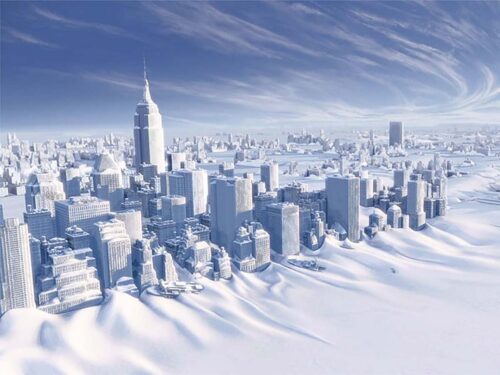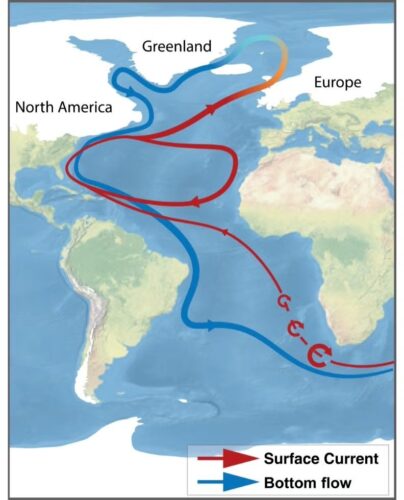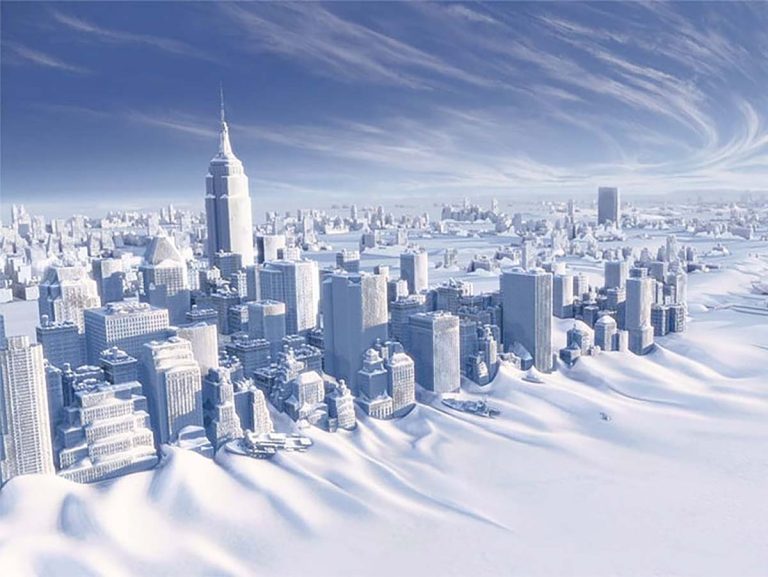
We hear again and again: Greenland's melting will soon cause the Gulfstream system to collapse due to global warming, and it will be difficult to restart as a result. [emphasis, links added]
Then we see the huge disaster portrayed as the one depicted in the dramatic climate film “After Tomorrow.”
The salinity of seawater in the north is crucial because higher salt content is high, and salt-rich tropical water will cool and sink.
First, this is the pump that makes circulation possible. It can transport a very large amount of heat to the North Atlantic Ocean, keeping Europe on a milder side in winter.
A scenario has been recently released that if the Gulfstream system is “off”, a large area of (especially Europe) is calculated.
But these situations proved to be exaggerated and alarming.
Yuxin Zhou, a postdoctoral researcher in the Department of Earth Sciences at the University of California, Santa Barbara, recently returned to history to study when it existed 68,000 years ago, from 68,000 to 16,000 years ago, the Laurenson ice sheet existed, with thicker ice covering North America and even New York City.
Now that huge ice shelf no longer exists, so This scale no longer has the potential for ice melting and iceberg release.
The situation is very different today, not so dramatic
By analyzing ocean sediments deposited by icebergs floating on the North Atlantic, Zhou found that the ocean current of AMOC heat transfer had been moderately weakened before all icebergs floated on the North Atlantic.
Zhou compared with what he is today, and Zhou said: “In contrast, the cycle is very dynamic at present”, which shows that Greenland's melt is unlikely to knock the North Atlantic into another deep freeze, something alarmists have been bothering.
In addition, the technology network here is added (added focus):
Not all melting has the same effect on the Atlantic cycle. With the influence of icebergs, freshwater has a much greater impact on AMOC than released after melting on land. Icebergs can cool the surrounding sea water and freeze it into sea ice. Ironically, this ice layer acts as a blanket that keeps the sea warm and prevents it from falling deeper and drives the Atlantic cycle. More importantly, icebergs go farther to the sea than runoff, providing fresh water to areas where deep water forms. ”


So if Greenland's glaciers retreat further, they will only melt on land and release fresh water on the coast, rather than releasing the icebergs to the sea. This will mean a much smaller impact on AMOC.
Stop bad luck
Zhou’s summary:
“We are very anxious about the speed of climate change and the drama of the change. But it's good climate news and hope to dissuade people from climate doom and give people hope because we really need hope to fight the climate crisis.”
Hat tip: eike
Read more in the No Skills Area
